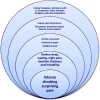Living with a symptomatic rotator cuff tear 'bad days, bad nights': a qualitative study
- PMID: 25008095
- PMCID: PMC4105791
- DOI: 10.1186/1471-2474-15-228
Living with a symptomatic rotator cuff tear 'bad days, bad nights': a qualitative study
Abstract
Background: Rotator cuff tears are a common cause of shoulder pain. There is an absence of information about symptomatic rotator cuffs from the patients' perspective; this limits the information clinicians can share with patients and the information that patients can access via sources such as the internet. This study describes the experiences of people with a symptomatic rotator cuff, their symptoms, the impact upon their daily lives and the coping strategies utilised by study participants.
Methods: An interpretive phenomenological analysis approach was used. 20 participants of the UKUFF trial (The United Kingdom Rotator Cuff Surgery Trial) agreed to participate in in-depth semi-structured interviews about their experiences about living with a symptomatic rotator cuff tear. Interviews were digitally recorded and fully transcribed. Field notes, memos and a reflexive diary were used. Data was coded in accordance with interpretive phenomenological analysis. Peer review, code-recode audits and constant comparison of data, codes and categories occurred throughout.
Results: The majority of patients described intense pain and severely disturbed sleep. Limited movement and reduced muscle strength were described by some participants. The predominantly adverse impact that a symptomatic rotator cuff tear had upon activities of daily living, leisure activities and occupation was described. The emotional and financial impact and impact upon caring roles were detailed. Coping strategies included attempting to carry on as normally as possible, accepting their condition, using their other arm, using analgesics, aids and adaptions.
Conclusions: Clinicians need to appreciate and understand the intensity and shocking nature of pain that may be experienced by participants with known rotator cuff tears and understand the detrimental impact tears can have upon all areas of patient's lives. Clinicians also need to be aware of the potential emotional impact caused by cuff tears and to ensure that patients needing help for conditions such as depression are speedily identified and provided with support, explanation and appropriate treatment.
Figures
References
-
- Yamaguchi K, Tetro AM, Blam O, Evanoff BA, Teefey SA, Middleton WD. Natural history of asymptomatic rotator cuff tears: a longitudinal analysis of asymptomatic tears detected sonographically. J Shoulder Elbow Surg. 2001;10:199–203. - PubMed
-
- Health and safety executive. Musculoskeletal disorders. 2012. [ Http://www.hse.gov.uk/statistics/causdis/musculoskeletal/msd.pdf]
Publication types
MeSH terms
LinkOut - more resources
Full Text Sources
Other Literature Sources
Medical
Research Materials


